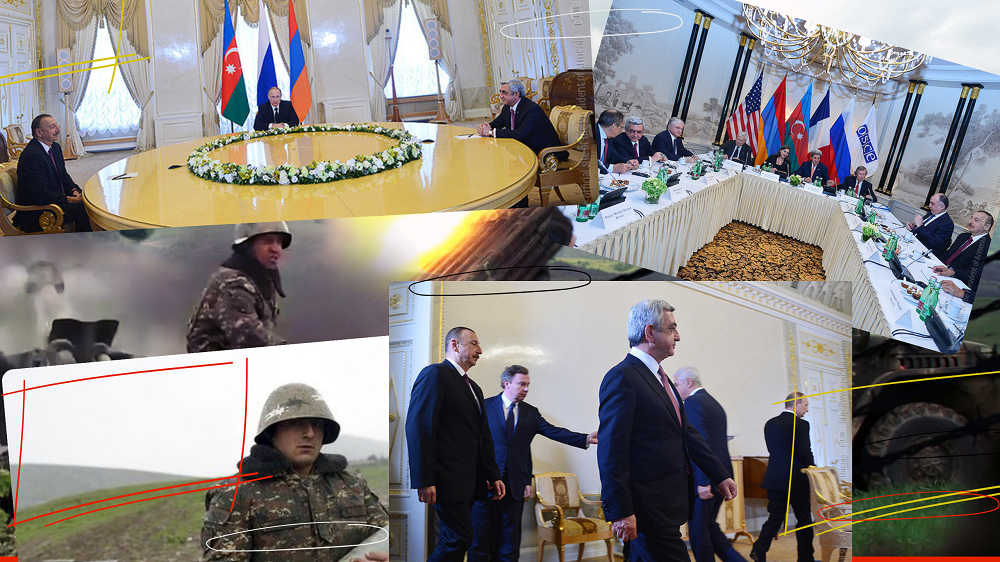Today marks the 9th anniversary of the April Four-Day War. At around 3:00 a.m. on April 2, 2016, the Azerbaijani armed forces launched large-scale offensive operations along the entire Nagorno-Karabakh contact line. The attacks were most severe in the Talish, Martakert, Martuni, and Aghdam directions. The Armenian armed forces lost 110 service members, and 120 were wounded.
Notably, the April Four-Day Clashes were the first large-scale military operations to take place after the 1994 ceasefire. Accordingly, what happened was not just military clashes but had a profound political subtext, a warning nature.
Azerbaijan's military actions, without exaggeration, fundamentally undermined the illusion of the impossibility of war and the immutability of the status quo, which had been circulating since the 1998 palace coup.
It was already apparent that maintaining the status quo for a long time was impractical, and there was an international consensus on this issue. The international community, especially the Russian Federation, whose intervention stopped the four-day hostilities, no longer wanted to tolerate the unresolved state of the conflict, especially since the Russian Federation, in particular, had profound and long-term plans for the Middle East and needed to "strengthen its rear."
However, instead of concluding what had happened and taking concrete steps, the opposite happened. The Armenian government, led by Serzh Sargsyan, continued its policy of maintaining the status quo in the domestic political arena with renewed vigor, this time putting into circulation the concept of the "Nation-Army" (also enshrining it in the government program) and gave a signal of excluding concessions in the issue of the settlement of the Nagorno-Karabakh conflict. Moreover, throughout this period, the message of not giving up the "security zone" was presented to the domestic audience as before. At the same time, the prospect of returning the seven regions to Azerbaijan was freely discussed on international platforms, thus continuing the vicious practice of duality of domestic and foreign rhetoric.
It is noteworthy that after the April 2016 clashes, an unprecedented activation of Russian mediation efforts became evident in the negotiation process. Russian President Vladimir Putin personally organized the second meeting of the presidents of Armenia and Azerbaijan, moving the agenda of the conflict settlement from Vienna to St. Petersburg.
If the focus of the meeting in Vienna on May 20, 2016, was the introduction of investigative mechanisms to prevent further escalation, then a month later, on June 20, the scope of discussions in St. Petersburg was significantly expanded. The statement issued as a result of the trilateral meeting noted, "The leaders of the states confirmed the fact of reaching mutual understanding on several issues, the implementation of which will create an opportunity to form favorable conditions for progress in the settlement of the Nagorno-Karabakh conflict."
With this formulation, the parties were hinting in a veiled manner that the process towards settling the Nagorno-Karabakh conflict is rapid, with the prospect of achieving tangible results. On July 12, 2016, during his visit to Baku, Russian Foreign Minister Sergey Lavrov stated directly that "the sides are closer than ever to the prospect of success in the Karabakh conflict resolution issue... Russia and Azerbaijan are discussing concrete steps that can and should lead to resolving the Karabakh issue."
Russia took the negotiation process "revived" after the April War under its direct control, replacing the issue of introducing investigative mechanisms with those above "concrete steps" for resolving the Nagorno-Karabakh conflict.
However, while Azerbaijan and Russia were discussing "concrete steps that could lead to the resolution of the Nagorno-Karabakh issue," Armenia was noticeably passive within the framework of this agenda.
In this context, the first President of the Republic of Armenia, Levon Ter-Petrosyan, who, despite the political opposition, met with President Serzh Sargsyan after the April events, stated at the ANC congress in December 2016, "It seems that the shock caused by the April war in particular should have had a sobering effect on the Armenian authorities, forcing them to radically rethink the destructive, destructive policy adopted in the Karabakh issue and develop a completely new strategy to confront these challenges. However, judging by the reaction of the ruling regime, disappointment awaits us in this issue as well because instead of the expected realistic steps, it has put into circulation a new absurd ideology, which again leads us to a dead end, bringing all the negative consequences. We are talking about the idea of creating a "nation-army," which, unfortunately, was included even in the program of the newly formed government."
He also reaffirmed the need for an immediate resolution of the conflict: "Today, we are once again faced with the imperative not to miss another opportunity to resolve the Karabakh conflict, as evidenced, in particular, by the serious efforts made by Russia in this direction recently. have noted on this occasion that the key to the solution of the Karabakh problem lies in the hands of Russia, and now its efforts are coming to confirm the veracity of this statement. Moreover, the West, among whose priorities, as mentioned, the settlement of the Karabakh conflict does not occupy a primary place, undoubtedly not only recognizes but also values Russia's exceptional role in this issue.
And then what happened happened: a 44-day war, then the final depopulation of Nagorno-Karabakh.
Arman Galoyan


















